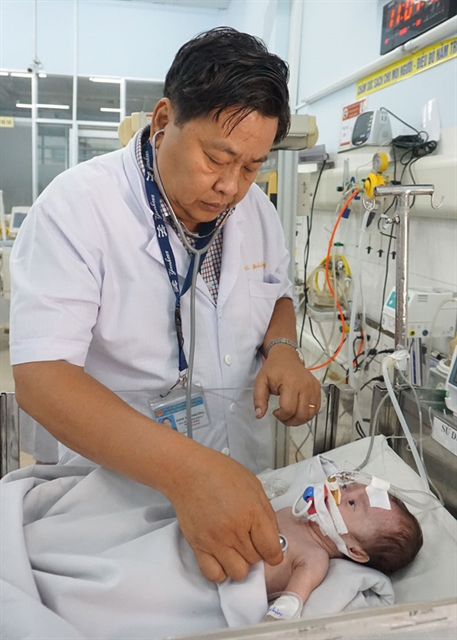 Society
Society

In a 200-square-metre room, Dr Khâu Minh Tuấn is busy on his rounds, asking patients about why they are in hospital and performing a rapid medical evaluation.

|
| Dr Đinh Tấn Phương, head of the Emergency Department at HCM City’s Children No1 Hospital, checks a baby. Photo thanhnien.vn |
HCM CITY In a 200-square-metre room, Dr Khâu Minh Tuấn is busy on his rounds, asking patients about why they are in hospital and performing a rapid medical evaluation.
The process commonly lasts less than two minutes. Within 15 minutes, eight patients – all on stretchers – have been moved to the emergency room. They are all in critical conditions.
Tuấn repeats the process in rapid succession without taking a single minute break to save the lives of these patients. He is head of the Emergency Department at HCM City’s People’s Hospital 115.
“In this department, most patients are in an extremely serious condition, and there's rampant overcrowding. We are always racing against time to save patients’ lives,” he told Thanh Niên (Young People) newspaper.
Tuấn said the emergency department received between 400-500 patients each day. Many cases are hospitalised from traffic accidents, labour accidents, food poisoning, fighting or attempted suicide.
Some patients are clinically dead, so we have to resuscitate them.
“You need to have nerves of steel to work in the emergency department. Sometimes I can’t remember what day it is, but I can tell you about all the patients I have treated,” Tuấn said.
Dr Đinh Tấn Phương, head of the Emergency Department at HCM City’s Children No1 Hospital agreed, saying nerves of steel helped doctors deal with professional tensions and face all sorts of emotions with patients' families.
Phương said emergency physicians always had to give direct, short and quick commands to treat young patients.
“Most suffer from severe respiratory failure, cardiovascular collapse, convulsions, coma, poisoning or cardiac arrest. Their lives are in our hands so we have to act quickly,” he said.
Phương said emergency physicians worked seven days a week during the day and spent their nights reading up on the latest techniques, which means they don't have much time for themselves.
“Being an emergency doctor is a full-time job. An emergency doctor needs to be ready at any time,” he said, adding doctors often wake up in the middle of night because of dreaming on the hospital’s alarm was quite common.
According to doctors, the pressure was immense, but the remuneration remained modest.
Currently, the night shift pays VNĐ100,000 (US$4) per person.
In addition, workplace violence is another problem they have to deal with. Emergency doctors are frequently victims of physical or verbal assaults. They are also at high risk of infectious diseases.
Figures from the Ministry of Health’s Medical Examination and Treatment Department showed that the number of assaults in the healthcare sector accounted for a quarter of all workplace violence.
Most of the assaults (80 per cent) occurred at national and provincial hospitals, and 85 per cent of the victims were doctors and nurses.
Working in the emergency department is a high pressure job, doctors say, but they will keep doing their jobs as long as patients need them. VNS




